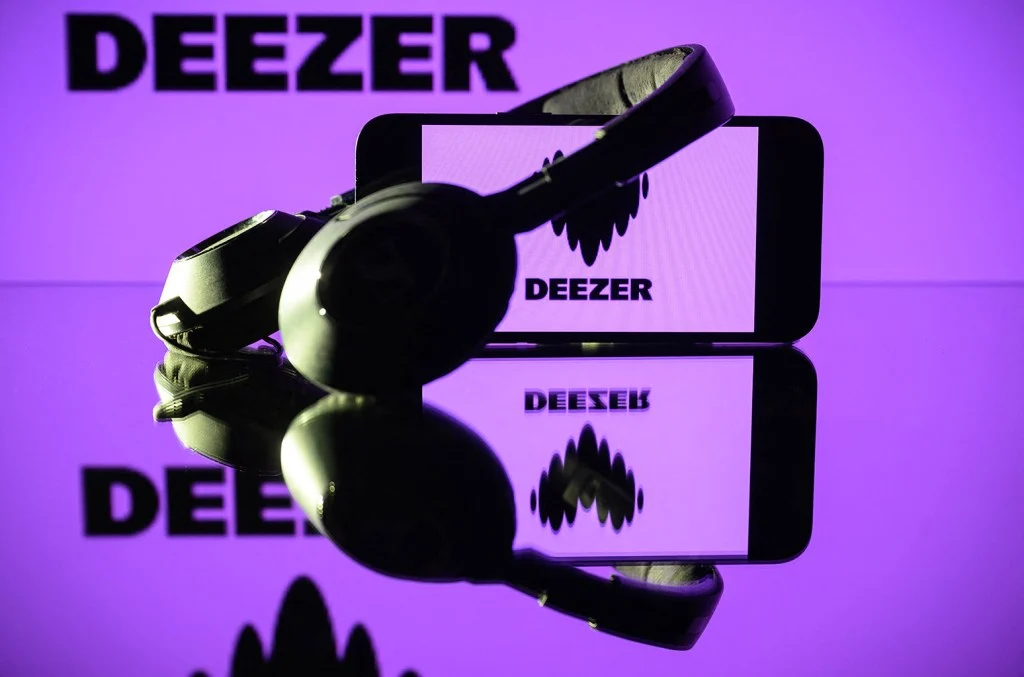earnings
Page: 4
Live events company Madison Square Garden Entertainment (MSGE) improved its revenue 6% to $243 million in the fiscal third quarter ended March 31, the company announced Tuesday (May 6). Operating income of $27.3 million marked a 63% improvement. The results “reflect continued strong consumer and corporate demand as well as a wide variety of live […]
While many public companies are struggling amid the backdrop of macroeconomic uncertainty and the looming threat of global tariffs, music company executives are beating the drum for music as a stable place to invest. Despite a plateauing of the growth curve, revenue from streaming subscriptions continues to drive relative stability at Spotify, Unversal Music Group […]
In the historically slow first quarter, Live Nation’s revenue dropped 11% to $3.38 billion (an 8% decline in constant currency), but adjusted operating income (AOI) fared better, declining 6% (or 0.5% in constant currency) to $341.1 million.
As the U.S. economy teeters and businesses brace for a protracted and uncertain trade war, Live Nation, the world’s largest concert promoter and ticketing company, believes the business will recover from the slow start to the year. CEO Michael Rapino expects 2025 to be “a historic year for live music, with a strong start having us on track to deliver double-digit growth in operating income and AOI this year,” he said in a statement.
The first quarter is relatively slow as concerts are concentrated in clubs and theaters before festivals, stadium and amphitheater shows appear later in the year. In 2024, the first quarter accounted for just 16% of Live Nation’s full-year revenue, and the concerts division received just 15% of its 2024 revenue in the first quarter. The second and third quarters, in contrast, accounted for 59% of 2024 revenue.
Trending on Billboard
Various financial metrics portend well for a stronger finish to 2025. Through mid-April, event-related deferred revenue — money collected for future concerts — of $5.4 billion was up 24% year-over-year. The 95 million concert tickets sold for Live Nation concerts represented a double-digit increase. On-sale sell-through rates were at or better than the same period last year. Ticketmaster’s primary ticketing volume was up 5% and gross transaction value (GTV) was up 10%.
The various divisions expect to have similar margins to previous years. Concerts’ AOI margin should be consistent with the 3% achieved in 2024. Ticketmaster’s AOI margin should be in the high 30s and sponsorships in the low 60s.
Absent stadium and amphitheater shows that occur later in the year, Live Nation’s concerts business had $2.48 billion in revenue, down 14% (11% in constant currency) from the prior-year quarter, from 22.3 million fans who attended 11,300 events. Concerts’ adjusted AOI improved to $6.6 million from a $1.8 million loss a year earlier.
In the ticketing segment, revenue fell 4% (1% at constant currency) to $695 million, and adjusted AOI of $253.1 million was down 11% (7% in constant currency). Concerts’ primary GTV was up 9%. Of the 78 million fee-bearing tickets, a number that was consistent with the first quarter of 2024, concert tickets were up 4% and accounted for 60% of volume. Non-concert tickets were down 9%.
Sponsorship revenue of $216.1 million was up 2% (9% at constant currency) while the division’s adjusted AOI of $136.0 million was up 5% (11% in constant currency). In the quarter, Live Nation secured new name-in-title sponsorships, including Citizens Live at The Wylie and Synovus Bank Amphitheater at Chastain Park.
Foreign exchange affected AOI by 5% due to Live Nation’s exposure to the Mexican peso and other Latin American currencies. The company expects foreign exchange headwinds to result in low, single-digit impacts to revenue and AOI in the second quarter.
Audio entertainment giant SiriusXM reported declines in first quarter revenue and net income on Thursday.
Revenue declined 4% to $2.07 billion and net income declined 15% to $204 million for the quarter ending March 31 compared to the year-ago period. Lower operating expenses from staff cuts and the reversal of Sirius’s streaming strategy partly offset the declines, and SiriusXM’s share price was trending downward, by about -3.4%, as of noon in New York.
It was the first full quarter of company earnings since SiriusXM moved away from its effort to develop a streaming audience and doubled down on its core listener base in vehicles, and it comes amid increased economic uncertainty.
Executives attempted to fend off investor concerns saying that macroeconomic jitters are not likely to negatively impact Sirius’s subscribers, its consumption in cars or marketing revenue.
Trending on Billboard
“Our strong, recurring revenue-driven business positions us well in this period of heightened volatility,” Tom Barry, SiriusXM chief financial officer, said in a statement. “We do not anticipate that tariff-related pressure on new car sales will have a material impact on our subscriber or financial performance this year. That said, like every business, we’ll continue to closely monitor ongoing developments and broader consumer health.”
The company reported adjusted earnings before interest, taxes, depreciation and amortization (EBITDA) declined 3% in the quarter to $629 million from $650 million a year ago. SiriusXM’s adjusted EBITDA margin held flat at 30%.
SiriusXM reported a 303,000 decline in subscribers to bring its total number of subscribers to roughly 33 million, which drove a 5% reduction in the business division’s subscriber revenue. Average revenue per user of $14.86, a 3% decline from the prior year.
The SiriusXM division reported gross profit declined 6% to $937 million resulting in a gross margin of 59%.
SiriusXM’s podcast business, which launched two new Alex Cooper channels in the quarter, reported 70 million monthly listeners and a 33%- year over year increase in podcast revenue for the quarter.
The division also said it signed a new agreement that will put SiriusXM’s super premium 360L in all new Mitsubishi vehicles from 2025 through 2030.
SiriusXM’s Pandora and off-platform business reported a 2% decline in total revenue of $487 million largely driven by weaker advertising performance. Ad revenue declined 2% to $355 million as softer digital ad revenue was partly offset by greater podcast revenue. Subscriber revenue for the division held flat at $132 million.
Subscriber acquisition costs for SiriusXM rose 11%, or $10 million, from the year ago period as a result of contractual changes with certain carmakers, the company said. This was partly offset by a nearly 20% decrease in sales and marketing expenses, in addition to significant decreases in product and technology costs and administrative expenses.
South Korea’s HYBE used its artists’ heavy touring schedule and strong merchandise and licensing revenues to overcome a slight drop in recorded music sales in the first quarter of 2025.
In the historically slow first quarter, total revenue rose 38.7% to 500.6 billion KRW ($350 million), the second-lowest quarterly revenue since the first quarter of 2023. Earnings before interest, taxes, depreciation and amortization (EBITDA) of 47.3 billion KRW ($33 million) was up 19% from the prior-year period.
“Typically, the first quarter is a period when artists take a break after busy year-end activities and prepare for new albums and projects,” CFO Kyungjun Lee said during the earnings call Tuesday (April 29). “Therefore, in Q1, we had relatively fewer album releases and content offerings, thus posting a slightly lower profitability compared to the prior quarter.”
Trending on Billboard
Recorded music revenue fell 5.9% to 136.5 billion KRW ($95 million), with streaming accounting for almost half of recorded music sales, said CEO Jaesang Lee. “While album sales fluctuate quarter over quarter depending on release schedules, steady streaming revenue serves as a stable source of profit. Streaming helps mitigate recorded music sales volatility in quarters like this quarter, when the number of new albums is relatively smaller.”
Concerts revenue jumped 252% to 155.2 billion KRW ($108 million). CEO Lee cited the “huge success” of tours in South Korea, the U.S., Japan and elsewhere in Asia by J-Hope, TOMORROW X TOGETHER, ENHYPEN and BOYNEXTDOOR. Additionally, J-Hope’s solo shows in Mexico “marked the beginning of active expansion to the Latin market,” he added.
Merchandise and licensing improved 75.2% to 106.4 billion KRW ($74 million). Whereas concert-related merchandise was most popular in the past, HYBE has found success with artists’ character-driven merchandise, such as for Seventeen’s MINITEEN, a group of animal representatives for the band. “All the character products have been selling really quickly, and many items are in high demand, resulting in additional rounds of pre-order sales,” said CFO Lee.
Content revenue fell 32.7% to 41.2 billion KRW ($29 million). It included sales of the Seventeen in Carat Land Memory Book and BTS 7 Moments, an archive of group members throughout 2022 and 2023 that includes a 66-minute video and 180-page photo book.
CEO Lee also teased details of Big Hit Music’s upcoming boy band that will debut in the third quarter of 2025. He described the five-member group as “a next generation creator crew that pursues self-expression in completely new styles and senses” and will perform “very original music that has not existed in the past.”
Separately, a seven-member, all-Japanese boy band called aeon will debut in June. Created by YX Labels, HYBE’s Japanese operation, the group formed from a TV show that aired in Japan on Nippon TV from February to April.
Deezer’s total quarterly revenue edged 1.1% higher in the first quarter of 2025, the French streaming company reported on Tuesday (April 29), as its top executive reiterated the company’s target to achieve profitability this year.
Deezer reported revenue of 134 million euros ($145.08 million) in the first quarter, driven primarily by 6.3% growth in its direct subscriber base in France, bringing the total number of subscribers there to 3.5 million.
Deezer achieved positive free cash flow and its first break-even year in fiscal 2024, and CEO Alexis Lanternier said the company will achieve positive adjusted earnings before interest, taxes, depreciation and amortization (EBIDTA) in 2025. Deezer expects total revenue for 2025 to be flat or slightly decline from fiscal year 2024, as it forecast no meaningful increase in average revenue per user (ARPU). However, the company maintained it will “generate positive free cash flow for the second consecutive year,” according to a press release.
Trending on Billboard
“We started the year with positive momentum, delivering revenue growth in line with our expectations and further increasing our direct subscriber base in France,” Lanternier said in a statement. “With confidence, we confirm our 2025 guidance and our objective of reaching profitability this year.”
Founded in August 2007, Deezer has embarked on a range of initiatives aimed at achieving profitability, including raising prices on its direct subscribers in France; doubling-down on its strategy to gain subscribers through partnerships with companies like the German broadcaster RTL, American speaker company Sonos and Latin America’s Mercado Libre; and through the introduction of new customization features for users and opportunities to directly interact with artists.
Deezer’s total subscriber base now stands at 9.4 million, down from what it said was 10 million subscribers on a like-for-like basis in the first quarter of 2024. Of those 9.4 million subscribers, 5.3 million are direct subscribers, mostly in France, while 4.1 million subscribers come from partnerships. Revenue from Deezer’s direct subscriber base contributed 86.6 million euros ($93.8 million), up from 86 million euros ($92.8 million) a year ago. Partnership subscribers contributed 39.2 million euros ($42.4 million), down from 43.3 million euros ($46.7 million) a year ago.
The decline in partnership subscriptions, which drove an overall 3.4% drop in the revenue Deezer receives from countries outside of France, was primarily due to the conversion of users who came to Deezer through its partnership with Mercado Libre called MeLi+. Some promo users converted to premium users “with higher [average revenue per user] & margins,” the company said. The decline in partnership subscriptions and revenue was partly offset by a ramp up in Deezer’s partnership with RTL+, the company said. Deezer renewed long-term partnerships with Bouygues and Orange in the first quarter.
Strong subscription revenue helped Universal Music Group’s first quarter revenue rise 11.8% year over year (or 9.5% in constant currency) to 2.9 billion euros ($3.05 billion at the average exchange rate in the first quarter), the company announced Tuesday (April 29). Adjusted earnings before interest, taxes, depreciation and amortization (EBITDA) also rose 11.8%, to 661 […]
Spotify’s first quarter revenue rose 15% as its subscriber base increased 12%, the company’s highest first quarter subscriber gains since early in the COVID-19 pandemic, the company reported on Tuesday. The music and podcast streaming giant reported total revenue of 4.2 billion euros ($4.54 billion) in the quarter ending March 31, and total paying subscribers […]

Berlin-based music company BMG reported on Monday (March 31) that it generated 963 million euros ($1 billion USD) in revenue over the course of 2024, marking a 6.4% increase from the year-ago period, thanks to a double-digit jump in digital income streams a strong slate of major releases. The performance amounted to 8.1% in organic growth, the company said.
Digital revenue, which now accounts for 68% of BMG’s overall revenue, rose 16% in 2024, as BMG continues to see the fruits of moving oversight of its digital distribution business from WMG’s ADA to in-house in late 2023.
Operating earnings before interest, taxes, depreciation, and amortization (EBITDA) adjusted — BMG’s preferred metric for profit — rose 37% to 264 million euros ($274.2 million, based on the foreign exchange rate as of Dec. 31, 2024) compared to last year’s 194 million euros ($214 million, based on 2023’s year-end exchange rate).
Trending on Billboard
BMG CEO Thomas Coesfeld credited the “BMG Next” strategy — a localized yet globally scalable approach — for being pivotal in the company’s success in 2024, highlighting improvements in go-to-market strategies, digital distribution catalog acquisitions and technology. The company made significant changes to its global distribution strategy, including direct licensing agreements with Spotify and Apple Music and transitioning physical distribution management to Universal Music Group. BMG also invested around half a billion euros in catalog acquisitions — it counts 24 for the year — and signings, strengthening its rights portfolio through investment initiatives.
“Our BMG Next strategy has been instrumental in driving a successful 2024 with a step-change performance in a fast-evolving music market,” he said. “Building on the strong performance of our artists and songwriters, ongoing go-to-market improvements, such as insourcing digital distribution, and continued high investment into our people, catalog acquisitions and technology development, we achieved an incredible 2024.”
Notable successes in the recorded music sector included releases from George Harrison, Kylie Minogue, Bryan Ferry, Lainey Wilson, Sum 41, Travis, Crowded House, Rita Ora and others. The company signed new label deals with Blake Shelton, Mustard, YG, New Kids on the Block and K. Michelle, among others.
In music publishing, BMG songwriters such as Bruno Mars, D’Mile, Steve Miller, Trevor Horn, The-Dream, Roselilah and others achieved chart success, with contributions to major hits like Eminem’s “Houdini,” Beyoncé’s Cowboy Carter album, Kendrick Lamar and SZA’s “Luther” and Mars and Lady Gaga’s Hot 100 chart-topper “Die With a Smile.” BMG also signed or extended publishing agreements with artists, including Carly Pearce, KT Tunstall and Tyron Hapi, among others, and secured publishing agreements with Tomorrowland Music and Cirque du Soleil.
The company’s catalog division saw continued growth, with Mötley Crüe’s remastered ripper from 1989, Dr. Feelgood, driving a 10% increase in global streams and Australian garage rockers Jet (“Are You Gonna Be My Girl”) achieving milestones on streaming while selling out anniversary shows. Sync licensing also played a crucial role, securing placements in advertisements, trailers and TV series for artists like Lenny Kravitz, Jennifer Lopez, George Harrison, Pitbull and Rita Ora.
Here are some of BMG’s 2024 highlights:
Operating EBITDA adjusted jumped 37% to 264 million euros ($274 million) from the previous year of 194 million euros ($214 million).
EBITDA margin was 28% compared to the previous year of 21.4%.
BMG said it made 24 catalog acquisitions in 2024, compared to 30 the year before.
Tencent Music Entertainment surpassed revenue of $1 billion in the fourth quarter, representing an 8.2% increase from the prior-year period, while net profit climbed 47.3% to $284 million.
The Chinese music streaming company operates three music streaming services — Kugou Music, QQ Music and Kuwo Music — as well as WeSing, a karaoke app. In recent years, Tencent Music’s business has become increasingly dominated by its music services as its social entertainment business continues to lose business.
Online music revenue grew 16.1% to $799 million due to music subscription gains and growth in advertising revenue, while music subscription revenue jumped 18% to $552 million in the quarter as the number of subscribers increased 13.4% to 121 million. Additionally, gross margin jumped to 43.6% in the fourth quarter from 38.3% in the prior-year period. The company attributed the improvement to strong growth in music subscriptions and advertising revenue and increased usage of owned content, as well as its adoption of the Super VIP program, a subscription tier that costs five times the normal rate. Monthly average revenue per user (ARPU) grew to 11.1 RMB ($1.52) from 10.7 RMB ($1.47) due in part to the expansion of the Super VIP membership program.
Trending on Billboard
The social entertainment business has suffered a sharp decline since the Chinese government began cracking down on the use of live-streaming apps to enable gambling in 2021. In the fourth quarter, social entertainment revenue fell 13% to $223 million and mobile monthly active users declined 21.2% to 82 million (the number stood at 223 million at the end of 2020). Monthly ARPU fell 9.7% to 70.4 RMB ($9.64), down from 172.1 RMB ($26.38) at the end of 2020, and paying users slipped 3.8% to 7.7 million.
For the full year, revenue increased 2.3% to $3.89 billion while net profit climbed 36.2% to $974 million, and gross margin improved to 42.3% from 35.3%. Online music revenue grew 25.5% to $2.98 billion while social entertainment revenue fell 36.1% to $912 million. Full-year gross margin improved to 42.3% from 35.3% in 2023.
Tencent Music Entertainment’s music platforms have evolved into one-stop shops that also include audiobooks, merchandise, downloads and live-streaming. In 2024, the company produced physical albums for Xiao Zhan and Lay Zhang and boosted album sales for Esther Yu by providing options to purchase merchandise along with her digital albums. It also partnered with the band Mayday for an online New Year’s Eve concert.
The company also announced a $273 million dividend and a share repurchase program of up to $1 billion over a two-year period that will commence this month. A $500 million share repurchase program announced in March 2023 will conclude this month.
Tencent Music Entertainment’s shares, which trade on both the New York Stock Exchange (NYSE) and the Stock Exchange of Hong Kong, had risen 15.8% to $15.12 on the NYSE at the close of trading on Tuesday.

 State Champ Radio
State Champ Radio 









